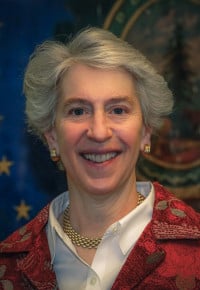
By Senator Alison Clarkson, Windsor-5
The 2018 Legislative session adjourned very late Saturday evening May 12. It always ends after about two weeks of intense negotiations between the House and the Senate resolving our policy differences in committees of conference. And, it is always a bit of a shock, after such focused work, to end so abruptly. The Senate adjourned at about 11:15 p.m. – about an hour before the House. As a result, few lingered to celebrate. Most of us packed up and drove home while we were still awake enough to do so safely.
In adjourning, we said goodbye to several of our colleagues who have chosen to retire from legislative public service. No matter their party, the Legislature is going to miss the contributions of these members. Our Windsor County delegation is losing Sue Buckholz and Gabrielle Lucke. We are grateful to both of them for their thoughtful work and additions to debates in the State House.
Our session began with legalizing the recreational use of marijuana and ended with enhancing school safety, improving workforce development, raising the minimum wage over six years, improving firearm safety and an employee paid family leave program. We also passed a balanced budget and an equitable tax bill. These bills took into account windfalls of tobacco and VW settlements and reflect a more robust revenue forecast which is encouraging. As these are one-time windfalls to Vermont, the Legislature felt it was appropriate to invest this money in one-time expenses. These settlements enabled us to buy down future state debt – which will save taxpayers over $100 million in teacher retirement liability, fill the Education Fund reserve, pay off the Vermont Life deficit, fund expenses like additional support for our dairy farms, a de-carbonization study, sexual harassment education, additional beds for acute mental health needs, tobacco cessation and smoking prevention programs, and studies on childcare demand, pre-kindergarten and Corrections healthcare.
The governor is unhappy that we did not apply all of these one-time monies to reduce our education property tax. But school spending is an ongoing expense – not a one-time expense. Our school boards worked really hard to hold education spending increases to only 1.5 percent statewide this year. That was impressive. Education is our number one economic development investment – and while we need to ensure this continues to be affordable for Vermonters – we should not be shielding Vermonters from a cost we have voted to support. One of the perennial concerns the Legislature has is how to improve the connection for voters between their vote to support their local schools and the bill they get in August.
With regards to the education property tax rate – for the 65-70 percent of property taxpayers who pay by income – we have lowered the property tax from 2.55 percent to 2.53 percent; for full rate payers the rate has increased 2 cents – from $1.50 to $1.52 and for non-residential payers it has increased from $1.53 to $1.59. The Legislature sets the statewide tax rate after Town Meeting’s school budget votes. This rate pays the bill local voters have elected to spend in March. There isn’t one of us who likes the idea of increasing our education property taxes — but this tax is a reflection of our local choices in school spending. To address the concern of “right sizing” our schools to our declining student population, the Legislature has asked a task force to make recommendations on staff to student ratios.
I appreciate hearing from you. I can be reached by email: [email protected] or by phone at home, 457-4627. To get more information on the Vermont Legislature, and the bills which have been proposed and passed, visit the legislative website: legislature.vermont.gov.
Sen. Clarkson can be reached by email at: [email protected] or by phone at the Statehouse (Tues.-Fri.) 828-2228 or at home (Sat-Mon) 457-4627.



